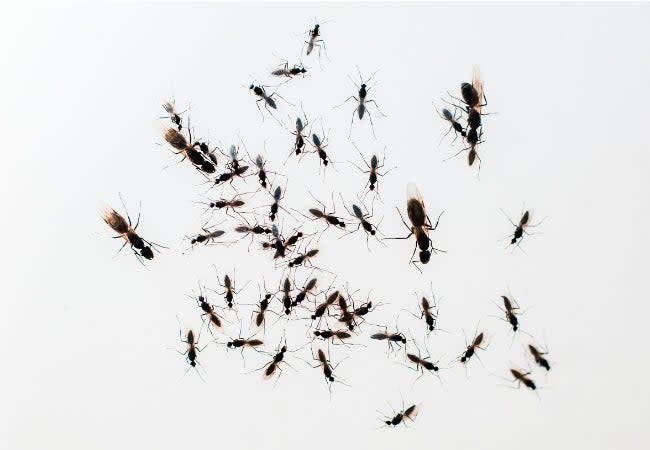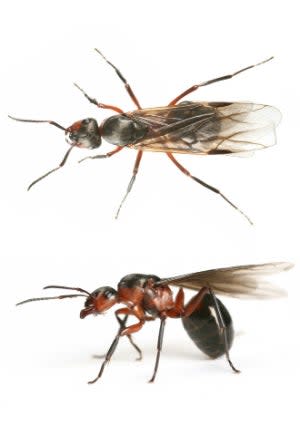How To: Get Rid of Flying Ants

Flying ants may seem more formidable than their tiny ant counterparts. Interestingly, though, flying ants—also known as swarmers or alates—aren’t actually a different variety of ant at all. They’re just regular ones that have grown wings for the mating season! (And, while different types of ants have different mating seasons, you'll most likely find swarmers in your home in times of high humidity or following heavy rains.)
Think you have a pest problem but aren't sure of which kind? At first glance, flying ants are often mistaken for termites, as both pests have four wings and antennae. Upon closer inspection, though, you'll see that termite wings are all the same size, whereas the front wings of flying ants are usually larger than the back wings. Plus, swarmers have the pinched waists typical to ants and elbowed antennae, unlike the straight ones of termites.
The good news: While they’re not fun house guests, flying ants are not nearly as destructive as termites and are completely manageable. As soon as you’ve identified your infestation, prepare for how to get rid of flying ants on your property with the following tools and techniques.
STEP 1: Removing Flying Ants

Photo: istockphoto.com
Dig out (or pick up!) any of these non-chemical solutions for ridding your house of these pests:
A vacuum is probably the easiest way to quickly remove a large swarm of flying ants. Simply suck the pests up with a handheld or full-sized vacuum and then immediately replace the vacuum bag.
A simple spray made from dish soap and peppermint oil spray will do the trick if the ants are scattered and difficult to reach by vacuum. Fill a spray bottle with one part liquid dish soap and two parts water. If you have peppermint oil on hand, add several drops. Shake the solution well, and spray it at the ants and the surrounding area. The soap will stick to the ants, dehydrating them and making it difficult for them to move or fly, and the peppermint oil will suffocate them.
Sticky tape traps are another great means for stopping flying ants in their tracks. If you don’t have any commercial glue traps on hand, you could lay out strips of duct tape, sticky side up, near where you think the ants are entering. Add a sprinkle of sugar or a few drips of honey on top of the tape to really attract, and then trap, the ants.
STEP 2: Preventing the Return of Flying Ants
You may have just spotted two or three flying ants that buzzed in through an open window. In that case, you probably don’t have to worry about ridding your home of a colony. But if you found a swarm, removing the existing flying ants isn’t enough. You must take measures to ensure these insects don’t continue to invade.
Determine the source.
First, try to find the colony by trailing the ants back from where they’ve come. This may or may not be possible. It could be that the ant colony is somewhere in your walls or underneath the home or building’s structure, in which case you can move on to the next steps to prevent the spread of flying ants. If you do find the colony, though, destroy it. The easiest and most effective way to do so is to pour boiling water over it. Keep the water as hot as possible until you quickly pour it into the hole on top of the colony where the ants emerge.
Seal the cracks of your home.
Even if you did find the colony, it’s still a good idea to make sure that any cracks in baseboards, windows, and walls are sealed. That way, future invaders won’t find an entrance to your home. Caulk any areas that look like they could be letting pests in from outside. If you haven’t found the colony, this is an especially important step, since you haven’t yet had the chance to shut down the source. Consider enlisting the help of a professional from one of the best pest control companies such as Orkin or Terminix to weigh in on the issue.
Spray for extra prevention.
It can be tough to know you’ve sealed every potential ant entrance. For a little extra prevention, mix one tablespoon of boric acid powder with a cup of water, or a separate solution with equal parts water and vinegar, and spray the area where you found the swarm. Either spray will cut down on the scent trails that the ants have left behind, making it more difficult for their buddies to find their way into your home.
Poison the flying ants.
After removing the initial swarm, stay away from the poisons that kill the ants on the spot. Instead, choose a poison that the ants will eat and then bring back to the colony, thus infecting future invaders. The main ingredient in those killers is Borax. You can make your own Borax trap by mixing one-and-a-half cups water, half a cup of sugar, and a tablespoon-and-a-half of Borax. Dip cotton balls in that solution and leave it near where you found the swarm or at other places you think they could find a way inside. Or, you can buy ready-to-use liquid bait traps from brands like TERRO that use Borax as the active ingredient at your local hardware store.